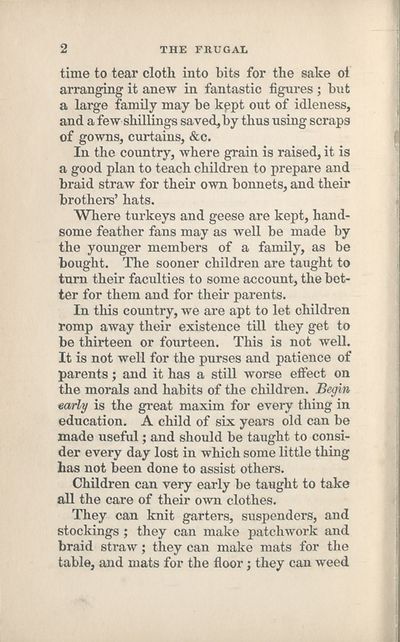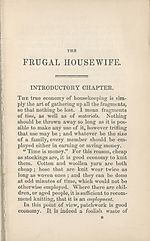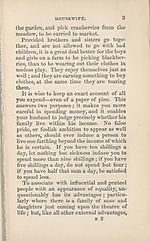Occupations > Frugal housewife
(10)
Download files
Complete book:
Individual page:
Thumbnail gallery: Grid view | List view

muoAL
time to tear cloth into bits for the sake oi
arranging it anew in fantastic figures ; but
a large family may be kept out of idleness,
and a few shillings saved,by thus using scraps
of gowns, curtains, &c.
In the country, where grain is raised, it is
a good plan to teach children to prepare and
braid straw for their own bonnets, and their
brothers’ hats.
Where turkeys and geese are kept, hand¬
some feather fans may as well be made by
the younger members of a family, as be
bought. The sooner children are taught to
turn their faculties to some account, the bet¬
ter for them and for their parents.
In this country, we are apt to let children
romp away their existence till they get to
be thirteen or fourteen. This is not well.
It is not well for the purses and patience of
parents; and it has a still worse effect on
the morals and habits of the children. Begin
early is the great maxim for every thing in
education. A child of six years old can be
made useful; and should be taught to consi¬
der every day lost in which some little thing
has not been done to assist others.
Children can very early be taught to take
all the care of their own clothes.
They can knit garters, suspenders, and
stockings ; they can make patchwork and
braid straw; they can make mats for the
table, and mats for the floor; they can weed
time to tear cloth into bits for the sake oi
arranging it anew in fantastic figures ; but
a large family may be kept out of idleness,
and a few shillings saved,by thus using scraps
of gowns, curtains, &c.
In the country, where grain is raised, it is
a good plan to teach children to prepare and
braid straw for their own bonnets, and their
brothers’ hats.
Where turkeys and geese are kept, hand¬
some feather fans may as well be made by
the younger members of a family, as be
bought. The sooner children are taught to
turn their faculties to some account, the bet¬
ter for them and for their parents.
In this country, we are apt to let children
romp away their existence till they get to
be thirteen or fourteen. This is not well.
It is not well for the purses and patience of
parents; and it has a still worse effect on
the morals and habits of the children. Begin
early is the great maxim for every thing in
education. A child of six years old can be
made useful; and should be taught to consi¬
der every day lost in which some little thing
has not been done to assist others.
Children can very early be taught to take
all the care of their own clothes.
They can knit garters, suspenders, and
stockings ; they can make patchwork and
braid straw; they can make mats for the
table, and mats for the floor; they can weed
Set display mode to:
![]() Universal Viewer |
Universal Viewer | ![]() Mirador |
Large image | Transcription
Mirador |
Large image | Transcription
| Antiquarian books of Scotland > Occupations > Frugal housewife > (10) |
|---|
| Permanent URL | https://digital.nls.uk/124249358 |
|---|
| Description | Thousands of printed books from the Antiquarian Books of Scotland collection which dates from 1641 to the 1980s. The collection consists of 14,800 books which were published in Scotland or have a Scottish connection, e.g. through the author, printer or owner. Subjects covered include sport, education, diseases, adventure, occupations, Jacobites, politics and religion. Among the 29 languages represented are English, Gaelic, Italian, French, Russian and Swedish. |
|---|

